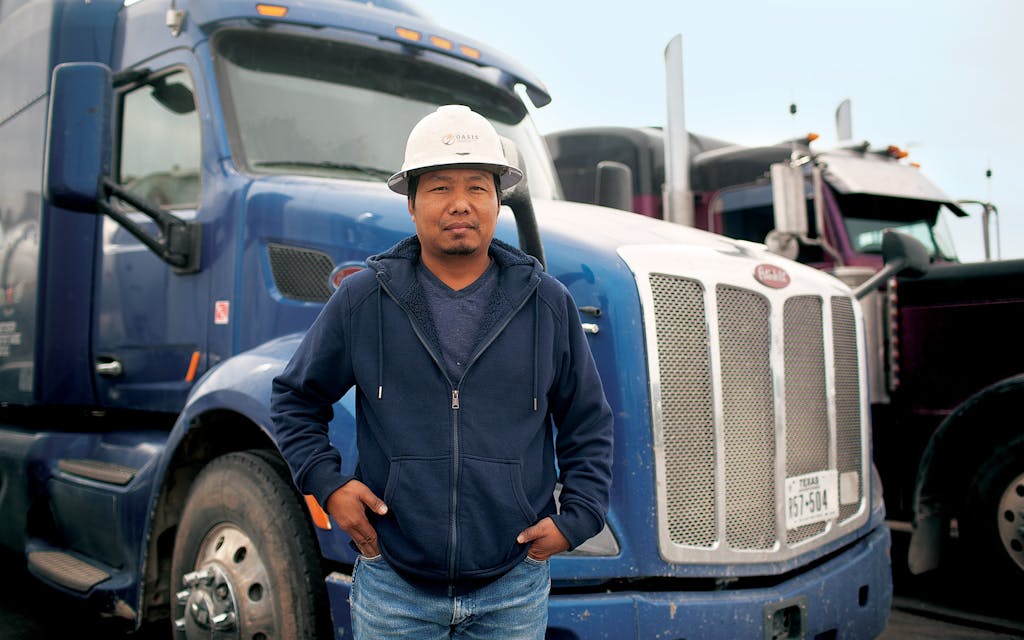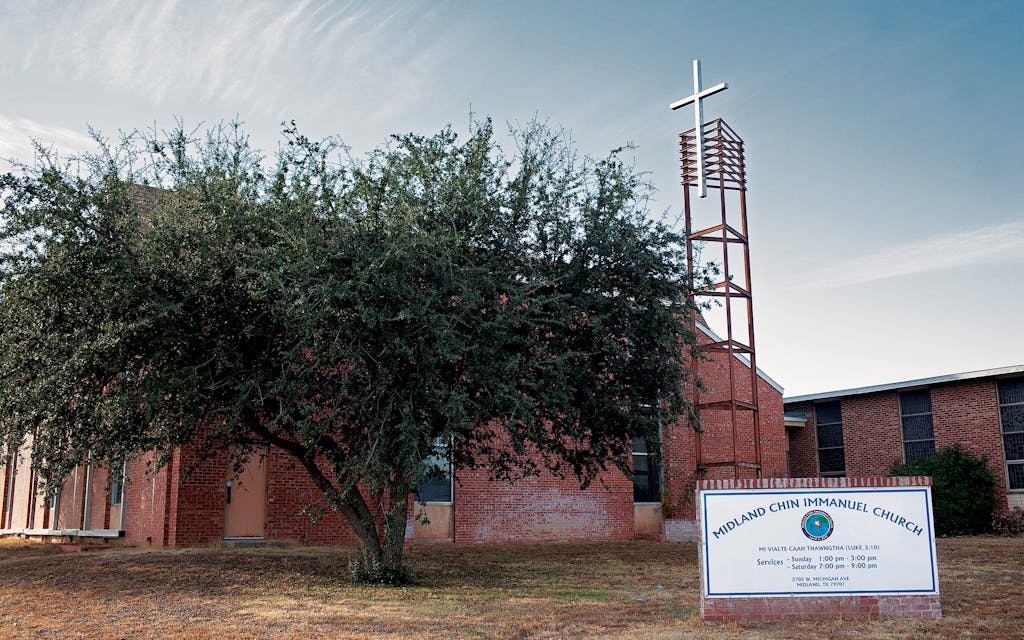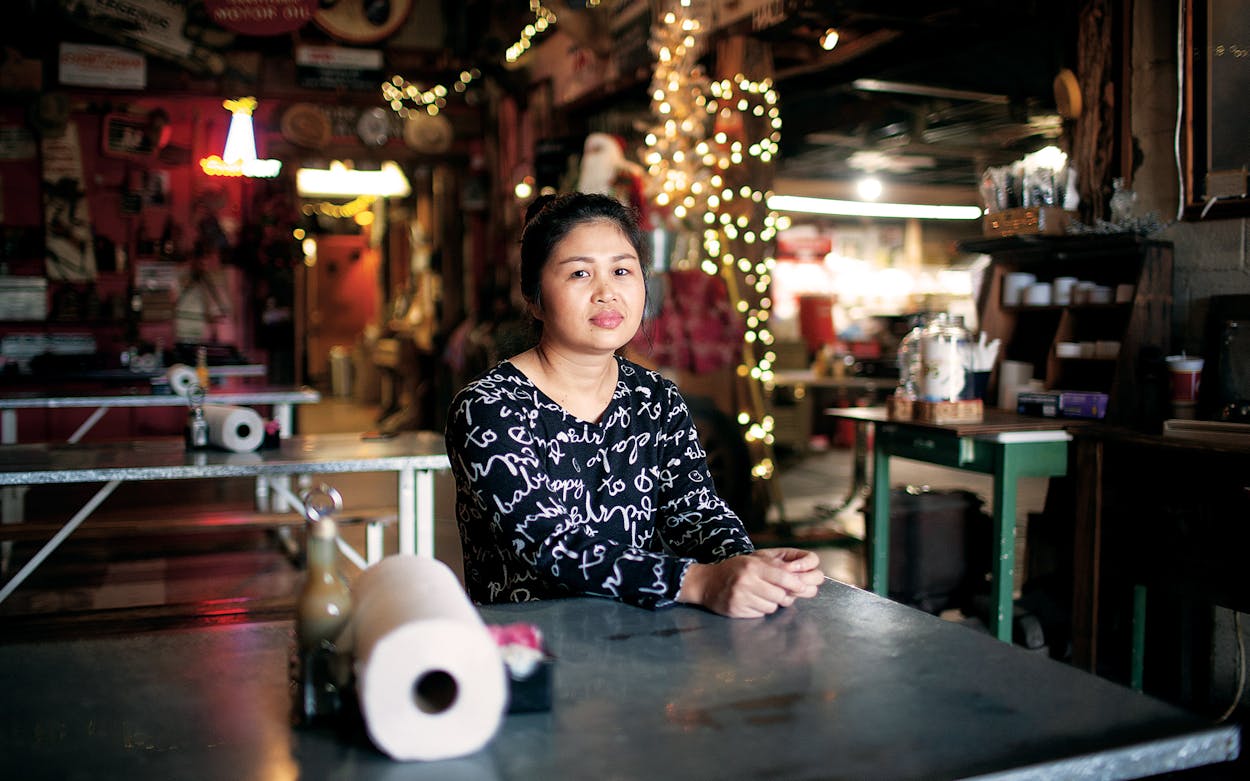Softened evening sunlight filters through the stained-glass windows of a former Lutheran church tucked into a neighborhood of modest ranch houses near the center of Midland. More than two dozen women—refugees from the southeast Asian nation of Myanmar—gather in the sanctuary of Chin Immanuel Church. The room fills with the sound of their native language as they share dreadful news from their homeland.
Mary Ngun Tha Sui (pronounced “Noon Tah Swee”), a 38-year-old mother of three who works at KD’s Bar-B-Q, finds a seat in the second row as stories buzz around her. One woman tells of how her cousin in Myanmar was recently shot in the head and killed by soldiers who caught him violating curfew. He’d been out searching for food, which, along with medical supplies, has been scarce in Myanmar since the start of the COVID-19 pandemic—an especially deadly event there—and has grown even harder to find since a coup began in February. Indeed, it seems every call from their home country brings these women terrible reminders of why they fled.
Mary and the others, all part of an ethnic minority group called the Chin, are here this summer evening for the inaugural meeting of a women’s association. According to the Chin Human Rights Organization, there are roughly 1.25 million Chin worldwide, with more than one million living in Myanmar. Concentrated in a mountainous area bordering both India and Bangladesh, the Chin are mostly Protestant Christians. Like the six other minority ethnicities in Myanmar, they have been the targets of decades of persecution by Myanmar’s military, the Tatmadaw, which is controlled by the Buddhist Burman majority. Since 2002, the U.S. has resettled many Chin refugees coming through India and Malaysia, and at least 70,000 Chin now live in the United States. About 4,000 Chin live in and around Lewisville, just north of Dallas. Another 2,000 are in Midland. They represent 1.4 percent of the city’s population, and their numbers are growing.
I befriended many members of the Chin community ten years ago, after my husband and I moved to Midland, and I’ve witnessed them feeling caught between two worlds. While parents are busy supporting their families both here and in Myanmar, some of the first Midland-born children of Chin refugees have grown into teenagers who are fluent in English (with a Texas twang) and in American culture, both of which their parents struggle to understand. “It is difficult to communicate even with my own children from time to time,” Mary tells me through a mutual friend who interprets for her after the meeting ends. Though she’s lived in the United States for thirteen years and speaks English, Mary isn’t comfortable discussing matters of the heart in a foreign tongue. “I know that I have to be involved more in my kids’ lives. However, I do not have the confidence to show up for school events, because I cannot communicate with anyone. I am afraid that I might embarrass my child.”
In some ways, many of the Chin here are living the American dream. Local Chin leaders say that members of their community have bought hundreds of houses, opened a few businesses, such as the Chin Asian Market, and operate all of the sushi kiosks inside Midland’s grocery stores. In the oil fields, Chin men have found good-paying jobs as roustabouts, pipe fitters, ditchdiggers, truck drivers, and diesel mechanics. After work, they often gather at local parks to face off on soccer fields. Midland ISD even issues some official communications in Hakha Chin, the most common dialect spoken in the city.
Still, the Chin and other Midlanders have at times butted heads, such as when a Chin family painted their home a bright color like they might have in Asia, or because of neighborhood road congestion resulting from multiple families sharing a single-family home. (That practice is common in Midland among oil-field workers, but it rankles some locals more when those moving in come from an unfamiliar culture.) Midland police occasionally receive calls from concerned neighbors who hear the sounds of chickens being butchered in Chin residential backyards. In March 2020, a Chin man and his two- and six-year-old children were injured in a stabbing in the Midland Sam’s Club by an assailant, visiting from Houston, who mistook them for Chinese and said he believed the family was spreading the coronavirus.
That attack and more-mundane squabbles are anomalies as far as Midland city councilwoman Lori Blong is concerned. “Many Midlanders would agree that we’re better for having Chin families interwoven into the fabric of our community,” says Blong, a native of the city and a longtime advocate for the group. The Chin community “embodies an entrepreneurial, gritty, hardworking spirit which fits right into the broader West Texan ethic of Midland.”
I’ve seen that firsthand. My husband Jacob and I, both native Texans, came to Midland in 2011 after working for four years at a privately run orphanage in China. When we arrived with our newborn baby girl, I felt unmoored back in Texas—reeling both from new motherhood and from missing Asia. So I managed an introduction to a few Chin women who spoke some English, and we began slowly building friendships over cups of tea. The Chin helped me feel at home in Texas again.


In recent years, I spent plenty of time taking offense on behalf of the Chin, railing against politicians who conflated refugees legally entitled to live in our country with undocumented immigrants, describing them as threats to U.S. safety and jobs. Given President Trump’s attitude toward immigrants, and his gutting of the refugee resettlement program, which left some Chin families separated, I had assumed the Chin would readily embrace President Biden. I was wrong.
Shortly after Biden’s inauguration, my family and I went to a Chin family’s home for a graduation dinner. We were celebrating one of my closest friends, who, after arriving as a fourteen-year-old refugee in 2009 speaking no English and with no prior formal education, had earned her white coat in Texas Tech’s physician assistant program. The men pushed the couches out of the way, and the women unrolled long, narrow mats down the hallway from the front door to the back, lining them with paper plates. A kitchen full of cooks heaped rice and stewed meat onto platters, spreading the bounty out on the mats along with small bowls filled with a spicy mix of chiles, lime juice, garlic, and ginger. We each found a spot on the floor, feasting and laughing and celebrating. After the meal, the men in the group peppered my husband Jacob, who works in the oil and gas industry, with questions. They wanted to understand why it seemed that Democrats were against the industry and asked him to weigh in on what he thought a Biden presidency might mean for the future of their oil-field jobs.
After that night, the first time in nearly ten years of friendship I realized my friends might not fit into the political box in which I’d put them, I pressed Mary’s husband, Lal “Khar” Hlawnching (pronounced “Lall Car Lawn-Ching”), for his thoughts on Biden and Trump. Khar, 39, became a U.S. citizen alongside Mary in 2015. To my surprise, Khar told me both he and Mary voted for Trump in 2016 and 2020. I began asking many others among the Chin about their views on the former president. Without fail, they agreed with Khar.

“In Midland, the Chin community likes Trump. The last election, I think more than 90 percent of Chin vote for Trump,” said Duh Luai, a local Chin leader. While there are no hard data available to back up his anecdotal observation, Luai knows his community well. The precincts where most of Midland’s Chin live have certainly voted as rock-red Republican as most of the rest of the city in recent elections.
Though the Chin are relatively new West Texans, their community’s dominant political perspective aligns with the region’s traditional conservative values: evangelical Christian social mores, reverence for entrepreneurial capitalism, and distrust of government.
“Big governments control people,” said Khar, who escaped an authoritarian military regime to come here. “Everybody likes free stuff, but we have to think about the country too. If too much is free, the country can collapse. If America collapses, the world collapses, and then China and Russia will grow.”
Fear of a rising China also had much to do with why Khar voted for Trump. “The way Trump handled China,” he said, “no president had ever done that before, and I liked it.” China has long exerted influence over Myanmar, taking a pragmatic approach that saw it maintain friendly relations with the democratically elected government, but then also support the military junta that deposed it in February. Khar, like many pro-democracy activists, believes the military’s assault on Myanmar’s minority groups, including the recent burning of Chin villages, wouldn’t persist if China weren’t backing the Tatmadaw up. “China sides with whoever has the power,” said Khar. “China doesn’t care about people. It only cares about money.”
Yet, while Khar liked what Trump had to say about China, he didn’t like the former president’s mean-spirited messages on other issues, including crudely ranting about women and calling African nations and Haiti “shithole countries.” “Presidents shouldn’t speak those kinds of words,” Khar said. “I like Biden’s personality more than Trump.” But he doesn’t like Biden’s policies toward the oil and gas industry, which offers the possibility of six-figure salaries for skilled workers with no higher education. Such opportunities are what brought Khar and his compatriots to West Texas.

The Chin community in Midland can trace its path here back to Duh Luai, who is sometimes known as “Louie.” He was making sushi in Florida when H-E-B recruited him in 2007 to do the same in one of its stores and gave him a choice of locations. He picked Midland because it was the hometown of George W. Bush, a president he admired, and a leading spot for oil and gas production, which Luai believed would provide work for his fellow Chin. “I was interested in this place for myself and for my people,” Luai told me.
When Luai first started rolling nori at the H-E-B on West Wadley Avenue, the Permian Basin was experiencing an oil boom. Abundant jobs in the oil fields created worker shortages in other local industries. So Luai called Chin family and friends scattered around the U.S., and they spread the word of good-paying jobs in Midland. That word reached Khar and Mary in May 2008. At the time, they’d only been in the U.S. for two months, and Khar was working part-time at a meat-packing plant in Illinois, a job that didn’t pay enough to cover the family’s bills. With Mary expecting their first son, they didn’t hesitate to board a bus to Midland for the possibility of making a couple of dollars more an hour, plus overtime pay.
Building their life in West Texas wasn’t easy. Complications after their son’s birth six months after they moved to Midland led to a long hospitalization for Mary, leaving Khar alone with a newborn baby in a small apartment in a strange city. Unsure how to juggle medical bills and rent and new fatherhood and his wife’s recovery, Khar learned that Midland is a place where strangers often still act like neighbors. Native Midlanders helped him sort out and pay medical bills while the Chin community helped him care for his wife and son.
Khar fled Myanmar in 2003, after the army confiscated his father’s farm, spurring a scuffle between Khar and an army officer and, later, a call for his arrest that Khar considered a death sentence. “A hard day in America is nothing like a hard day in Myanmar,” Khar said. “There is a way to overcome problems in America. Over there, you’re on your own. Over here, there’s always more than one path.”
Khar’s path in Midland began with a job on the loading docks at H-E-B. He kept that position for four years, then spent six more driving semitrucks for several local companies before going into business for himself in 2018. Khar and Mary took out a loan and bought a 2012 semi with 500,000 miles for $45,000, and Khar began contracting with a local company to haul sand for fracking to oil-drilling locations. “Everybody has a chance to change their life here,” Khar says. “Even me, a refugee.”
Today, Mary and Khar’s boys are thirteen, seven, and three, and the halls of their home are lined with framed school certificates and honor-roll awards. They have stable work and good incomes, enabling them to not only help support relatives back in Myanmar, but also send their eldest son to private school. They even just freshened up their kitchen, painting the cabinets the same shade of gray all the locals seem to love these days. “I’m no longer a citizen of Myanmar,” Khar said. “Midland is my home.”
- More About:
- Politics & Policy
- Refugees
- Midland






